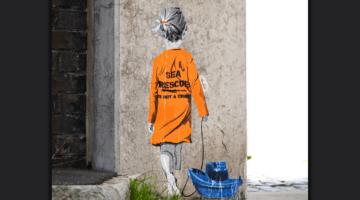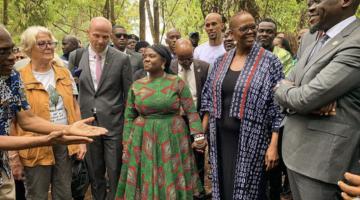In this series, we ask acclaimed authors to answer five questions about their book. This week’s featured author is Jessie Cox. Cox is Assistant Professor of Music at Harvard University. His book is Sounds of Black Switzerland: Blackness, Music, and Unthought Voices.
Roberto Sirvent: How can your book help BAR readers understand the current political and social climate?
Jessie Cox: The book proposes new ways of thinking about the interrelations between citizenship, migration, gender, and race. In its investigation it uncovers how belonging (national and otherwise) becomes delimited by legal, social, and political practices, always with an eye towards how we might begin creating a more radically inclusive world. Capitalizing on the unique methodology of using musical practices as a way to uncover critical theorizing of our world, the book provides an example of how we might find new ways to communicate and think with the lived experiences of those without a politically legible voice. Furthermore, it uncovers how we might think with Black lives beyond the known world, beyond the legible and possible, towards that which blackness has always been—a radical re-imagining. I tackle issues of our time, such as colorblindness, border policing, migration, identity, and do so, to open new possible paths forward. I center Black Switzerland as a lived experience that is unthinkable in our current world but nonetheless a fact since the beginning of modernity. These lives speak about blackness and antiblackness in music, in their lives as artists while Black—they musick and think in excess of normatively available language and discourses. Thus, how can we come to understand our current situation beyond the legible and lend an artistic, something like a musician’s, ear to the world’s unthought voices.
What do you hope activists and community organizers will take away from reading your book?
In many ways, this book is itself a call to be in commune, in excess of the currently possible communities. Black Swiss is a term that opens a possible discourse, just like I understand the development of the term Afro-German and the book Showing Our Colors to have been in the 80s in neighboring Germany. I hope that Sounds of Black Switzerland can open new ways of being in touch, in relation, and in conversations with others in excess of the very categories and networks we know. On the one hand, this involves showing how there are missed opportunities for being in touch. On the other hand, it is full of examples of people communicating across borders of existence. Without organizing a way to commune with others there is no discourse, no possibility to speak of and with lived experiences. I thus see the act of making art and of writing text as a form of preparation towards new possible networks, meetings, exchanges, or communities.
We know readers will learn a lot from your book, but what do you hope readers will un-learn? In other words, is there a particular ideology you’re hoping to dismantle?
This book articulates a particular kind of notion of pedagogy: it foregrounds how study is, after W.E.B. Du Bois, a process of continual exchange with the unknown in unforeseeable ways. Specifically, it is not a taking in of unknownness and turning such into holdable knowledge. Rather, the very act of study is aesthetic, is musical, is the continual learning that does not end and re-imagines us and the world. While advanced technologies feed off of a concept of knowledge that claims to be able to know the world in its entirety, black studies is a continual reminder that there is no absolute authority. Not because we know nothing, but because knowledge has become tied up with proper existence, with that which is visible, and I want to talk about those who make music “In A Silent Way” (to quote Miles Davis), invisible lives and ways of knowing. Music is often claimed to be absolutely abstract and without information. Similarly, Black Swiss lives are unthinkable, unspeakable, and unregisterable (or have been). Studying music as theory, searching for unthinkable voices, that is a process of giving up claims over knowledge as property. It means letting go of always already knowing who is speaking and what may be sayable. In this sense, this book proposes a learning that does not result in any final product but is a call to keep listening, to keep making music with others, so that we can come to hear new stories, unthought sounds, and (seemingly) impossible ways of living together. In short, opening a “new” discourse, such as black studies in Switzerland means also refusing a kind of finality of knowledge.
Which intellectuals and/or intellectual movements most inspire your work?
Showing Our Colors, the book by May Opitz (“Ayim”), Katharina Oguntoye, and Dagmar Schultz, that coincided with and spurred the study of Afro-Germany, is a big influence for my text. This work shows how study can mean simply a kind of care for the world and people, including oneself, that is rooted in the deep felt need to make a better world and create a space for conversations with Black life. This kind of question, of how to make a better world, is one I have myself begun articulating as such by way of Marshall Allen and the Sun Ra Arkestra (this phrase comes to my vocabulary by way of him). Musicians have been and continue to be a major inspiration to keep making unimaginable things become reality. For those musicians this does not just mean that there is some self-contained new sound, albeit it might also mean that. New sounds means that there are new ways to hear the world, to live and move as part of the world, by way of learning to make such sound. The screams that come out of Allen’s saxophone have changed the world, and I know more is to come. They have done so through changing not only what we may imagine to be possible but also institutionally, socially, economically, and materially. Fred Moten is another influence for this book, particularly his way of thinking with music and blackness. His writing presented me with a way to think and use language to articulate lives of those unthought, and for that I am forever grateful to him.
Which two books published in the last five years would you recommend to BAR readers? How do you envision engaging these titles in your future work?
Michael Gallope’s The Musician as Philosopher is a fascinating book since it is one of the few to center musician’s theorizing (Brent Hayes Edwards’ Epistrophies, and Daphne Brooks’ Liner Notes for the Revolution, are two other important contributions). There is of course a rich history of the role of musician’s thinking for academic scholarship, both in the humanities and the sciences, but the musicians themselves and their voices have not received much attention as themselves being creators of critical theoretical texts (both in terms of actually written language and music, amongst other forms of disseminating ideas). I am excited by the prospect of thinking about how the inclusion of artists and specifically musicians’ ways of theorizing within the space of so-called knowledge production may shift how we understand the role of not only scholarship, pedagogy, and knowledge, but also artists, and especially musicians and music making, within our society.
I have been fascinated by Susie Ibarra’s Rhythm in Nature. A book written by a musician documenting ways that she thinks about her practice of recording nature, centering specifically glaciers, which are disappearing because of the climate crisis.
Both of these books relate to my current work of opening a discourse around music that allows for making visible (or thinkable) a set of practices that in their artistic performance reimagine our relation to each other and our world. Thus, very much building on my first book, Sounds of Black Switzerland, I want to show how music can become a nexus to talk about things that are difficult to make legible and that require also always practice alongside theorizing. How might we think with musics that bring to the fore a tackling of the climate crisis and its relation to all those lived challenges such crisis is entangled in, such as antiblackness, migration, xenophobia, social justice, and so forth.
Roberto Sirvent is the editor of the Black Agenda Report Book Forum.



















